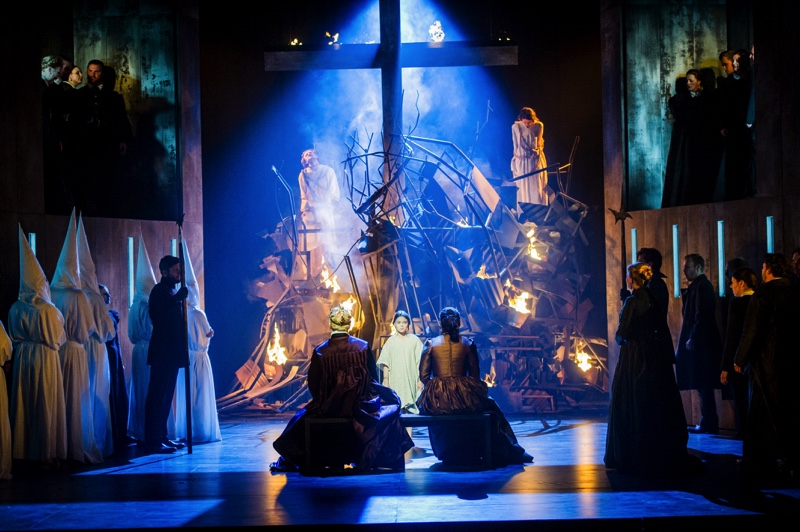Don Carlo, Grange Park, GPO, June 2016
Posted on 23 June 2016For a large opera house Verdi’s Don Carlo is quite a challenge, even in the four (rather than five) act version seen here. The great auto-da-fé scene at the end of Act II, where Carlo leads in a deputation from Flanders, threatens his father Philip II and is disarmed by Rodrigo, before the burning of the heretics, demands a spectacular staging, but Grange Park are up to the job. It is all hugely realistic, with the added vignette of a small girl bravely trying to approach the king while the pyre consumes her parents — a soldier carries her off to join them, a precursor to two later horrors seen in the closing moments of the opera.

All images Grange Park Opera
Yet this opera is replete with far more intimate scenes, and in Act I Ruxandra Donose as Princess Eboli delivered a beautifully stylish song of the veil to the queen’s ladies-in-waiting. Eboli can so often be a dull and dumpy mezzo, but Ms Donose is every inch the beauty known to history and her portrayal of the role developed from coquettishness to scheming fury, and eventually abject sorrow as she admits to unjustly traducing the queen, sleeping with the king, and finally cursing her own beauty — one of the highlights of the evening.

Eboli and Philip II
Verdi was a master of such intimate details, and in the confines of a smaller theatre they come over with visceral immediacy. For instance in Act I the interaction between the boldly robust tenor of Stefano Secco and the quiet dignity of Virginia Tola as the queen, or the excellent meeting between Clive Bayley’s commanding Philip II and the spirited Rodrigo of rising star David Stout, were moments of high drama that director Jo Davies made the most of. Less certain for me was the evident viciousness of the Grand Inquisitor, sung here by Alastair Miles, whose defiant bass matched Bayley’s King Philip. Based on the scheming and irascible holder of that office at the time (about 1560), his final use of a knife seemed out of keeping with his high authority, but the sets by Leslie Travers, costumes by Gabrielle Dalton and excellent lighting design by Anna Watson well suited the human drama exemplified by the music, ably conducted by Gianluca Marciano with the Bournemouth Symphony Orchestra.

The Queen and Carlo
For me this staging and setting realised very well the intimacy with which Verdi invested one of his greatest dramas.
Performances continue on various dates until July 10 — for details click here.

